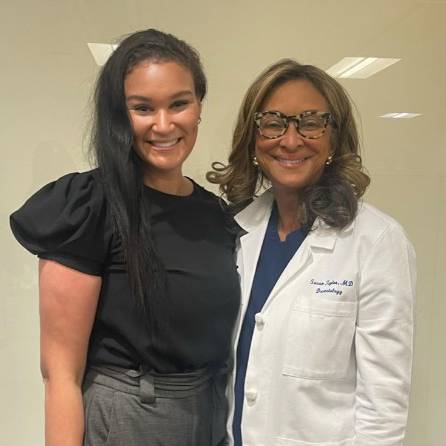
Mentee: Jazmin Newton
Mentor: Susan Taylor, MD
Perelman School of Medicine, University of Pennsylvania
Participating in the Skin of Color Society mentorship program played a crucial role in advancing my pursuit of a career in dermatology and further ignited my passion for this expansive field of medicine. The opportunity to work with Dr. Susan Taylor at the University of Pennsylvania Perelman School of Medicine was an unmatched experience for my education and future career. I had the opportunity to learn in depth about hair loss from an expert in the field, as well as learn about the innerworkings of clinical trials using novel drugs for common, distressing diseases.
I participated in scholarly work and undertook projects with ample guidance and support each step of the way. Additionally, the chance to be mentored by a Black female physician with similar interests and career goals was invaluable. Representation in medicine matters not only for patients, but also students and trainees—the chance to connect with someone like Dr. Taylor, that parallels who I want to be as a future physician and educator, was refreshing and empowering. I am forever grateful for this opportunity and look forward to giving back in a similar fashion as my career in medicine advances.
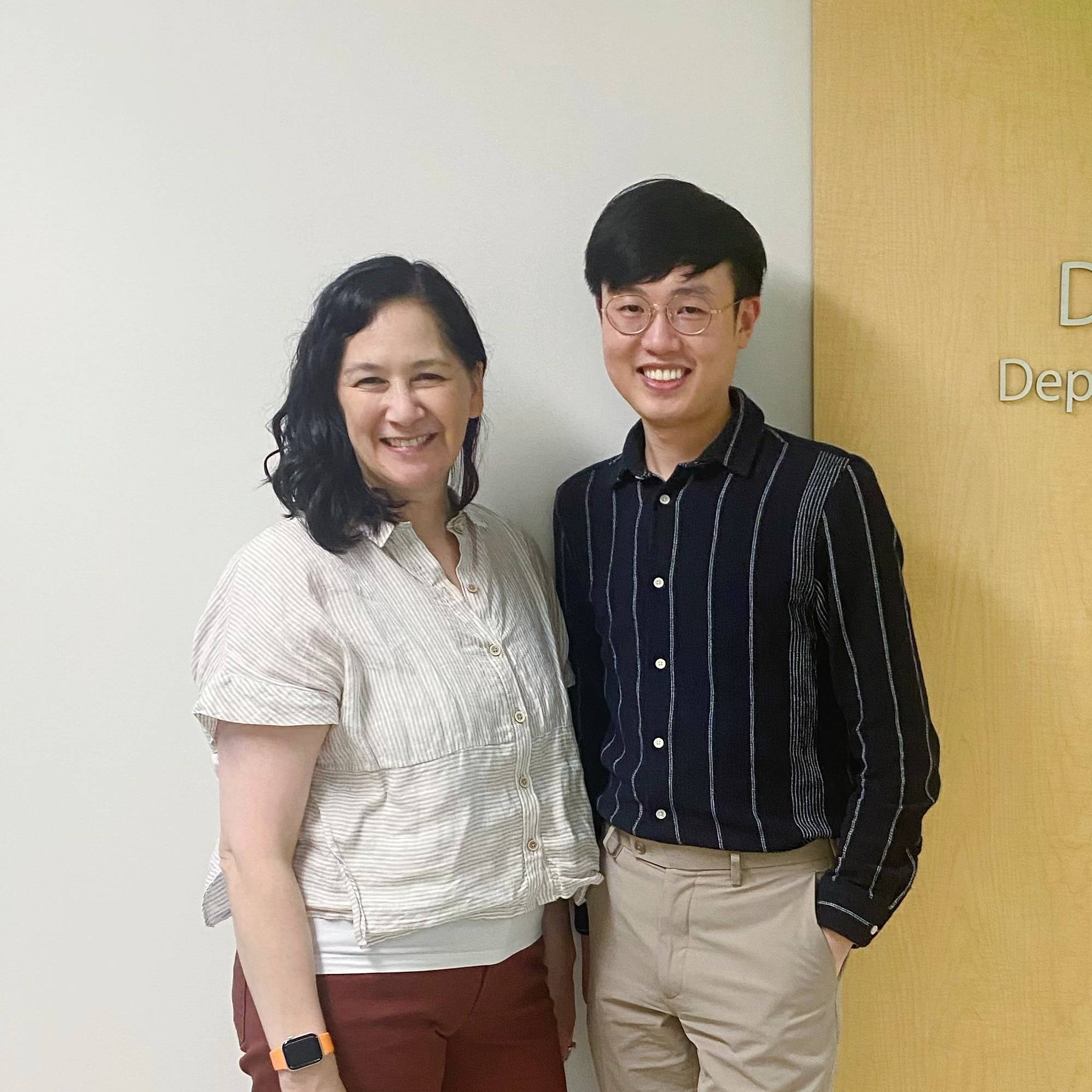
Mentee: Harry Liu, MD
Mentor: Michi Shinohara, MD, FAAD
University of Washington
I had the privilege of being selected for the Skin of Color Society (SOCS) Observership Grant and spending two weeks at the Division of Dermatology of the University of Washington in Seattle under the mentorship of Dr. Michi Shinohara. She is triple-board-certified in internal medicine, dermatology, and dermatopathology, and runs the cutaneous lymphoma clinic at the Fred Hutchison Cancer Center in Seattle. My mentorship experience was centered around skin of color (SOC) and quality of life regarding cutaneous lymphoma.
Dr. Shinohara built a diverse, meaningful, and educational schedule tailored to my academic interests. Before meeting her, she shared articles on SOC and quality of life in cutaneous lymphoma with me and I developed a stronger background understanding of the health disparities regarding the diagnosis and treatment of cutaneous lymphoma. At her lymphoma clinic, the learning was phenomenal, and I saw various kinds of common and rare cutaneous T-cell and B-cell lymphomas. I was truly amazed by her exceptional bedside manners and communications skills as she was able to explain the complex diagnoses of cutaneous lymphomas to patients from all backgrounds and provided individualized treatment plan with her patients via shared decision-making. She is an amazing teacher who is kind and truly cares about her learners. Besides the discussion we had after each patient encounter, she sat down with me to share her experiences, clinical pearls, and consideration of treating SOC patients with cutaneous lymphoma and improving their quality of life.
Besides Dr. Shinohara’s lymphoma clinic, I had the great pleasure of getting more exposure to SOC at other different clinics run by her colleagues, including the HIV clinic, the hidradenitis suppurativa clinic, and the melanoma clinic at several hospitals. In addition, I absolutely enjoyed learning at the Merkel cell carcinoma clinic, dermatopathology sign-out sessions, and inpatient rounding to appreciate the full spectrum of dermatology care. I felt very welcomed at every clinic I went to and all the attendings and residents I met were extremely friendly.
This observership program is certainly a highlight of my whole dermatology residency. Besides the educational aspect of the two weeks, I appreciated Dr. Shinohara spent time providing mentorship to support my career development. I would also like to thank SCOS for this memorable experience. I am confident I will be able to provide better and culturally competent care for SOC patients when I start practicing next year.
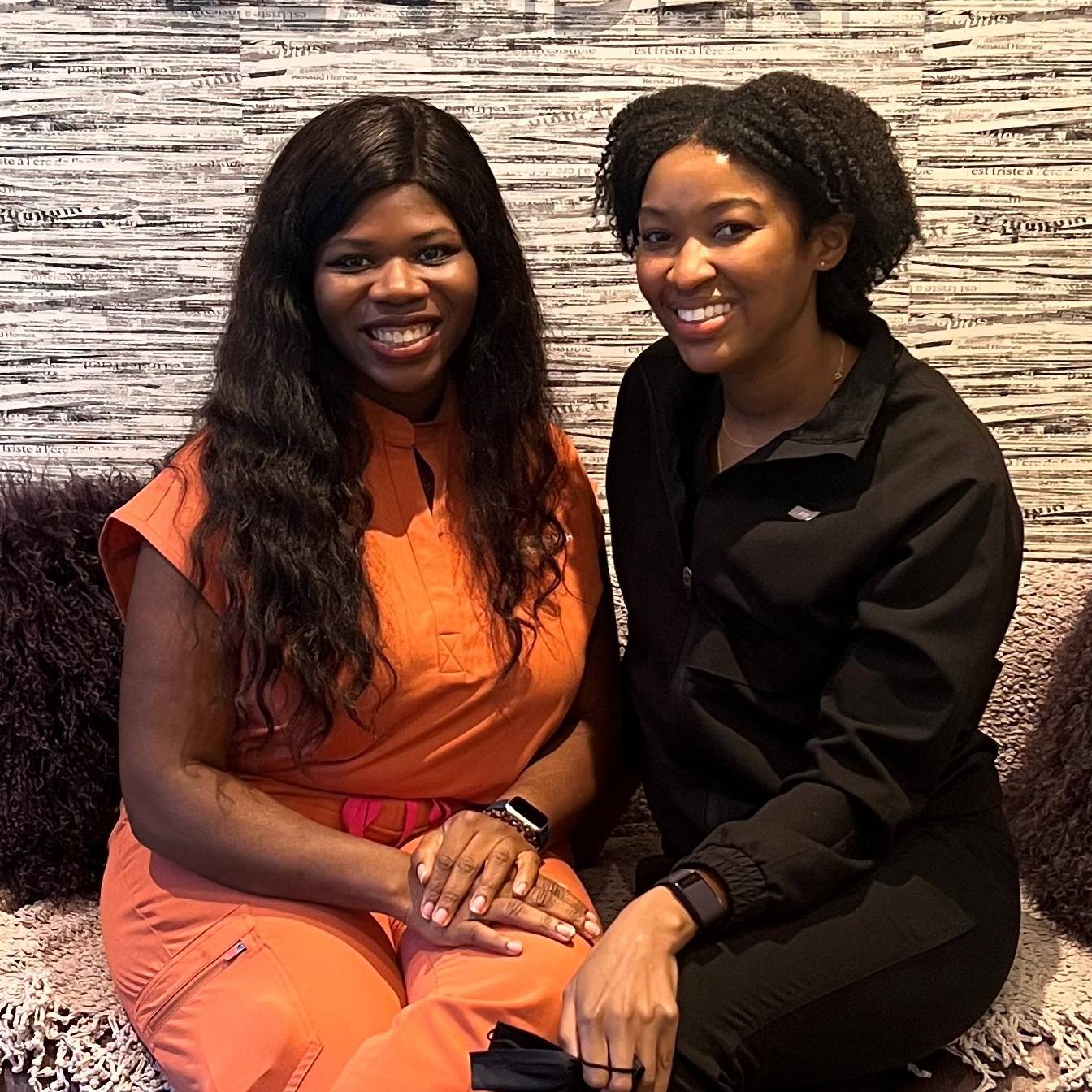
Mentee: Aderonke Obayomi, MD, MPH
Mentor: Elyse Love, MD
Glam Derm
The Skin of Color Society Observership Grant allowed me to have an amazing experience to work with Dr. Elyse Love at Glam Derm in New York City. As residents, we have limited glances into life as a private practice Dermatologist. This was an amazing opportunity to get a sneak peak of what daily life in private practice looks like. Dr. Love was very welcoming, accommodating and made me feel like I was a part of the team! Every day I learned about new techniques that I hope to one day incorporate into my practice.
Dr. Love is full of wisdom: from novel lasers, injection techniques, chemical peels, the business of medicine, popular prescription and non-prescription topicals, and how to protect yourself from burnout, this was an invaluable experience! Dr. Love has already built a loyal patient following and is a star within Dermatology. A career certainly worth emulating! Dr. Love was very open, and we discussed my career goals and navigating life after residency. I am so thankful to the Skin of Color Society for providing me with this opportunity to have gained a new mentor, colleague, and friend.
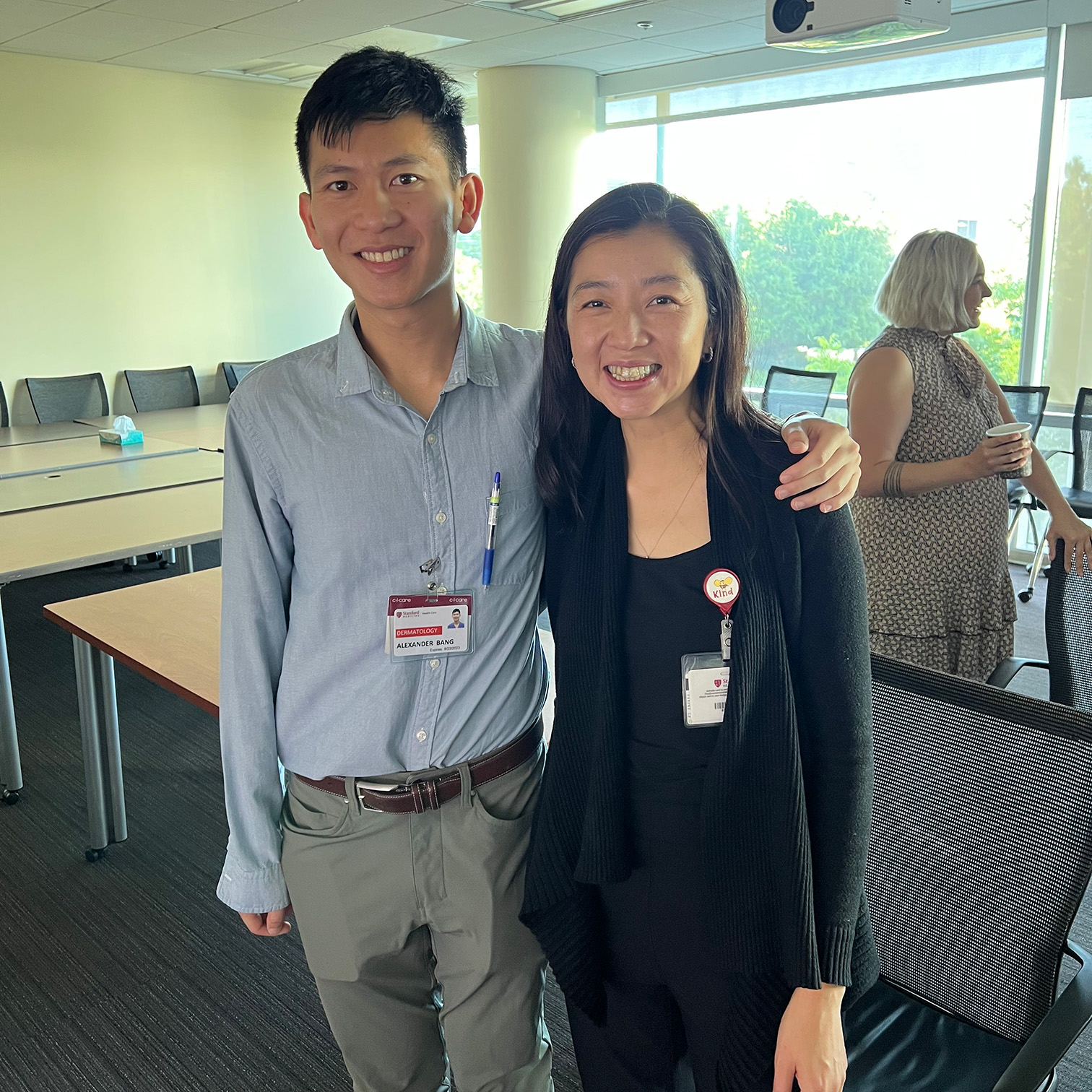
Mentee: Alexander Bang, BS
Mentor: Bernice Kwong, MD, FAAD
Stanford University
I am extremely grateful to have been a recipient of the SOCS Observership Grant, and had the opportunity to spend 3 weeks rotating with my SOCS mentor, Dr. Bernice Kwong, at Stanford University. During my time with Dr. Kwong and the department, I learned how cutaneous toxicities from cancer therapies may present differently in patients with skin of color and may be underrecognized by clinicians. Rotating with Dr. Kwong was such an enriching experience in my journey as a future dermatologist, as she allowed me to independently care for patients and walked me through her thought processes on how she takes care of her patients. During my first week, I presented a patient with skin of color with dupilumab-induced psoriasis from immune checkpoint inhibitor therapy at Stanford Dermatology’s first in-person grand rounds, and met many faculty in the department who were incredibly supportive and helpful with regards to providing our patient with potential management options.
My research projects with Dr. Kwong were also completed during rotation, with two submitted manuscripts that focus on dermatological conditions that disproportionately affect skin of color patients (erythema dyschromicum perstans and vitiligo) within the supportive oncodermatology space. Our hope is that clinicians will be able to recognize these conditions in patients on specific cancer treatments and learn how to manage them.
Outside of clinical and research endeavors, I met with Dr. Kwong frequently during the rotation where we also spent time discussing my career goals and preparing my residency application. I learned a lot from her on how she navigated her career while also maintaining an enriching personal life that I hope to emulate in the future.
Thank you to the SOCS for supporting my career and supporting my goal to eventually become a leader in the skin of color space within supportive oncodermatology. I hope to be able to give back as a mentor of the SOCS in the future. I would also like to thank Dr. Bernice Kwong for her unwavering support for me, and all the attendings and residents that I had the opportunity to learn from at Stanford Dermatology.
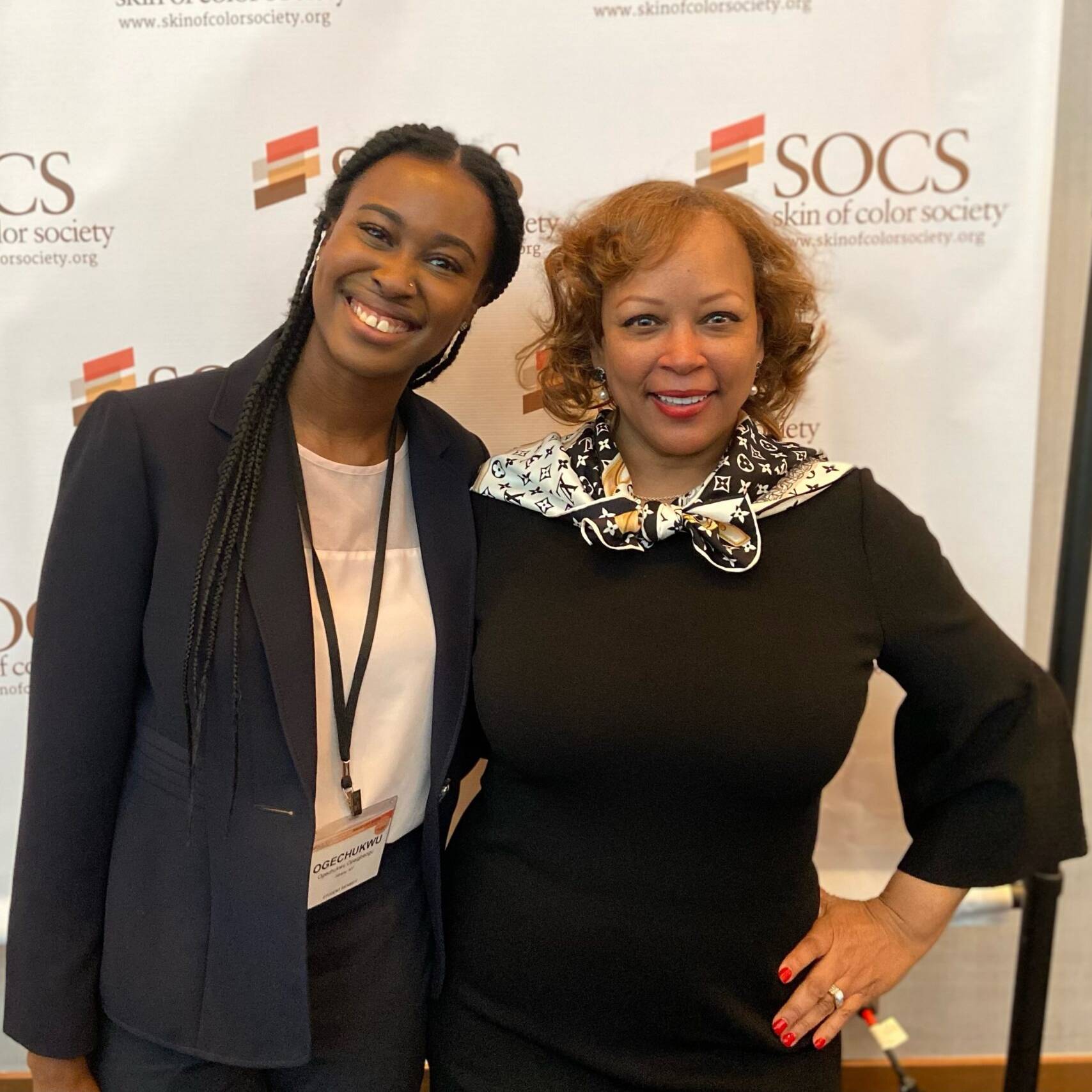
Mentee: Ogechukwu Opaigbeogu, BS
Mentor: Valerie Callender, MD, FAAD
Callender Dermatology and Cosmetic Center
I had the immense privilege to complete a rotation in the clinic of Dr. Valerie Callender this past May. This experience was made possible by the Skin of Color Society Observership Grant. During my month with Dr. Callender, I had the opportunity to work on both her medical and cosmetic side. I currently go to a medical school that does not have a dermatology department and does not offer a dermatology elective. This observership grant and rotation with Dr. Callender allowed me to get clinical experience that I otherwise would not have had the opportunity to receive.
On the medical side I got to see many complex dermatologic cases such as Central Centrifugal Cicatricial Alopecia. Many of the patients were in different stages of treatment including patients who had just been diagnosed and patients who had been undergoing treatment for a while and now were starting to see hair re-growth. I also was able to see many cases of acne vulgaris. During my time, I was able to assist with surgeries, discuss differential diagnoses, and ask questions about the various diseases I encountered.
On the cosmetic side, I was especially excited to see laser hair removal on darker skin types. Many dermatologist do not offer this procedure for darker skin types so it was really amazing seeing the procedure performed on patients with darker skin tones and seeing how the machine settings are adjusted to make it possible.
Overall the experience was a really great one and I am really appreciative to SOCS and the funders for providing this opportunity.